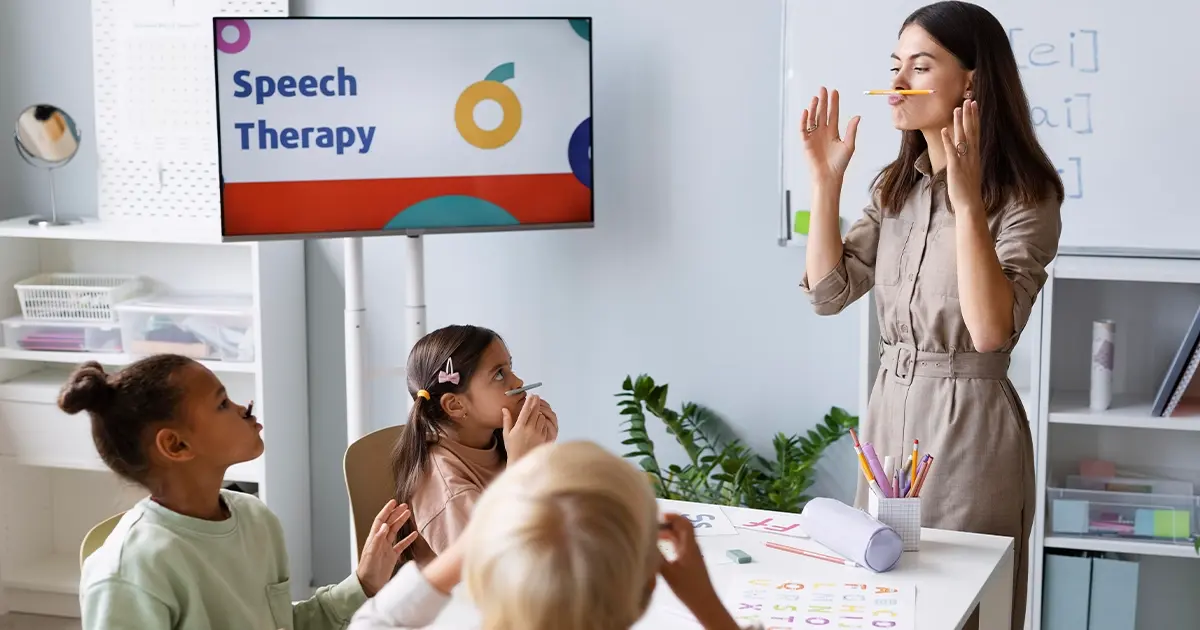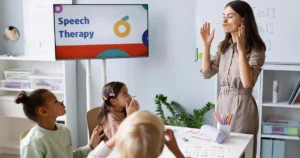When Emotions Feel Bigger Than Your Child Can Handle?
As a parent, you may have experienced moments when your child’s emotions seem bigger than they can handle. Maybe it’s a tantrum over something seemingly small, like the wrong color cup, or an overwhelming meltdown when transitioning from one activity to another.
These emotional storms can leave you feeling helpless, desperately trying calm voices, routines, or self-help techniques, but none of them seem to work. It’s exhausting for both you and your child. However, it’s important to understand that these meltdowns aren’t just “bad behavior” or simple defiance; they are signs of underdeveloped emotional regulation skills.
At Nurturing Wellness, we specialize in helping children understand and process their emotions. Through children’s therapy sessions, we give kids the tools they need to express themselves constructively, regulate their emotions, and build resilience for the future. In this blog, we’ll show you how our approach can transform emotional struggles into opportunities for growth, helping your child go from emotional overload to emotional mastery.
Why Kids Struggle with Big Feelings, and Why It’s Not Just a Phase?
The Real Reason Behind Tantrums and Shutdowns:
As children grow, their brains are still developing the areas that control self-regulation, like the prefrontal cortex. This part of the brain, responsible for problem-solving, emotional control, and decision-making, isn’t fully developed until adolescence. As a result, young children often don’t have the tools to regulate their big feelings. When they get overwhelmed, they may enter a fight, flight, or freeze response, leading to behavior like yelling, hiding, aggression, or withdrawal.
It’s important to realize that these outbursts aren’t tantrums for attention; they are signs of emotional overload without the necessary tools to cope.
Common Emotional Triggers We See at Nurturing Wellness:
At Nurturing Wellness, we work with children who struggle with emotional regulation due to various triggers:
- Transitions: Simple changes like leaving a favorite activity or moving from one task to another can be overwhelming.
- Frustration with Communication: Children often struggle to express themselves verbally and may resort to acting out when they can’t get their message across.
- Social Anxiety or Sensory Overload: Issues like bullying, unfamiliar environments, or sensory sensitivities can overwhelm a child’s emotional state.
- Unprocessed Trauma: Events like grief, divorce, or neglect can create deep emotional wounds that manifest as behavioral outbursts.
Without the proper support, these emotional challenges can become more ingrained, leading to difficulties with anxiety, low self-esteem, or peer conflicts later in life. Fortunately, with the right guidance, your child can develop the emotional tools they need to thrive.
How Children’s Therapy at Nurturing Wellness Builds Self-Regulation Skills?
1. Therapy Through Play, Not Pressure:
At Nurturing Wellness, we believe that the most effective therapy for children is not one that pushes them to talk about things they aren’t ready for, but one that meets them where they are. Children’s therapy sessions at Nurturing Wellness incorporate play therapy, art-based expression, and gentle conversations designed to engage children at their developmental level.
Kids often process their emotions through symbols and stories rather than words. Through activities like drawing, role-playing, and storytelling, our therapists help children explore big feelings such as:
- Anger and Frustration
- Fear or Rejection
- Loss or Confusion
By engaging with emotions in a way that feels safe and manageable, children can begin to understand that feelings are natural, and that they are capable of handling them.
2. Teaching the “Feelings Vocabulary” Your Child Might Be Missing:
A significant reason why children experience emotional overload is because they don’t know how to label their emotions. They feel frustration but don’t understand that it’s different from sadness or anger. This lack of understanding can make emotions feel more intense and unmanageable.
At Nurturing Wellness, we help children build a “feelings vocabulary” using tools like:
- Emotional Charts
- Emotion Cards
- Body-Based Awareness Tools
These tools allow your child to practice identifying what they’re feeling with words like “disappointed,” “overwhelmed,” or “ignored,” instead of letting these emotions overwhelm them. This process increases their emotional confidence and significantly reduces emotional explosions.
3. Building Personalized Coping Tools for Real-Life Moments:
In children’s therapy at Nurturing Wellness, we focus on developing practical coping strategies that children can use in everyday situations. Our therapists teach children techniques such as:
- Balloon Breathing: A calming technique that encourages slow, deep breaths.
- Safe Place Visualization: A mental technique to help children create a calming image they can visit whenever they feel overwhelmed.
- Using Sensory Tools: Sensory tools like fidget spinners, textured objects, or weighted blankets can help children ground themselves when their emotions begin to escalate.
Over time, these techniques help children recognize when they’re starting to get upset and give them the tools to calm down before they lose control.
4. Supporting Parents Alongside the Child:
At Nurturing Wellness, we don’t just work with children; we also work with parents. We help parents:
- Understand the Neurological Causes: We explain what is happening in your child’s brain when they experience emotional outbursts and how the brain develops emotional regulation skills.
- Reinforce Skills at Home: We provide parents with tools to help continue emotional regulation practice at home.
- Respond to Outbursts with Calm: We teach parents how to respond to their child’s emotional outbursts with calm, empathy, and effective boundary-setting.
Therapy is not just about what happens in the session, it’s about creating a holistic approach that extends into the home, school, and everyday life. We partner with families to ensure that emotional growth continues outside of therapy.
Practical Tips to Help Your Child Regulate, Even Before Therapy:
While therapy is the best way to provide long-term emotional support, here are some simple tools you can start using today to help your child regulate:
1. Use the “Name It to Tame It” Strategy:
When your child is upset, help them name their emotions:
“It looks like you’re feeling really angry. Can you tell me more?”
This strategy helps your child feel seen and understood instead of scolded or punished, reducing emotional intensity.
2. Create a Calm-Down Corner Together:
Designate a space in your home where your child can go to calm down. This could include:
- Pillows, soft lighting, and sensory objects like a stress ball or textured fabric.
- Emotion cards or calming visuals that help your child identify their feelings.
- A positive name for the space, such as “Chill Zone” or “Feelings Fort.”
Having a dedicated area for emotional regulation helps your child retreat to a safe space when they need it.
3. Practice “Feelings Check-Ins” at Neutral Times:
Ask your child about their feelings during calm moments, like at dinner or bedtime. For example:
- “What color was your day today?”
- “What made your heart feel big or small?”
This practice builds emotional fluency and creates a safe space for your child to talk about their feelings outside of crisis moments.
Why Parents Trust Nurturing Wellness for Children’s Therapy:
At Nurturing Wellness, we’re proud to offer a comprehensive, trauma-informed approach to children’s therapy in Mississauga. Here’s what sets us apart:
- Therapists trained in child psychology: Our experienced therapists understand the developmental needs of children and use evidence-based methods.
- Personalized therapy sessions: We customize each session to meet your child’s emotional, developmental, and sensory needs.
- A focus on skill-building: Our goal is to help children develop lasting emotional regulation skills, not just manage their behavior.
- Flexible scheduling: We offer both in-person and online children/youth therapy sessions to meet your family’s needs.
Many parents have shared how their children have not only learned to express their feelings but also built emotional resilience that lasts. One parent said, “I used to dread school mornings. Now, after just a few sessions, my child can name their feelings, and we’re finally talking instead of yelling.”
Give Your Child the Tools to Thrive:
If your child struggles with overwhelming emotions, you’re not alone. With the right support, they can learn how to navigate big feelings with confidence and clarity.
At Nurturing Wellness, our experienced therapists help children:
- Understand and express their emotions
- Learn real coping skills to manage big feelings
- Build emotional resilience and confidence at home and school
Ready to help your child thrive emotionally? Schedule a free 15-minute consultation with us today!





